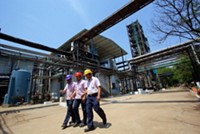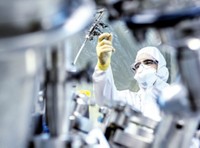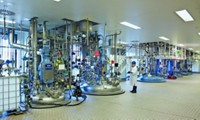Advertisement
Grab your lab coat. Let's get started
Welcome!
Welcome!
Create an account below to get 6 C&EN articles per month, receive newsletters and more - all free.
It seems this is your first time logging in online. Please enter the following information to continue.
As an ACS member you automatically get access to this site. All we need is few more details to create your reading experience.
Not you? Sign in with a different account.
Not you? Sign in with a different account.
ERROR 1
ERROR 1
ERROR 2
ERROR 2
ERROR 2
ERROR 2
ERROR 2
Password and Confirm password must match.
If you have an ACS member number, please enter it here so we can link this account to your membership. (optional)
ERROR 2
ACS values your privacy. By submitting your information, you are gaining access to C&EN and subscribing to our weekly newsletter. We use the information you provide to make your reading experience better, and we will never sell your data to third party members.
Pharmaceuticals
Probiodrug Leverages Local Expertise
Case Study #3: Carbogen Amcis navigates chemistry and uncertainty under contract on an Alzheimer’s disease therapy
by Rick Mullin
March 12, 2012
| A version of this story appeared in
Volume 90, Issue 11

Probiodrug, a biopharmaceutical company based in Halle (Saale), Germany, is about to advance its lead drug candidate, a small-molecule therapy for Alzheimer’s disease called PQ912, to Phase II clinical trials. PQ912 targets glutaminyl cyclase, a metalloenzyme that catalyzes the formation of a cyclic structure on the end terminus of peptides in brain cells, initiating and accelerating the progress of the disease. Since patenting the therapeutic approach, Probiodrug has been honing the route to the molecule through a series of projects with Carbogen Amcis, a contract manufacturing organization (CMO) that is about to scale the process up for clinical production.
COVER STORY
Probiodrug Leverages Local Expertise
PQ912 is the culmination of years of work at Probiodrug, which was founded 15 years ago by Konrad Glund and Hans-Ulrich Demuth, pioneers in dipeptidyl peptidase-4 (DPP4) inhibitors for diabetes treatment. Their work with DPP4 led them to glutaminyl cyclase as an Alzheimer’s disease target.
Glund, the firm’s chief executive officer, says Probiodrug will advance PQ912 in the typical fashion, working under contract with a CMO to produce a clinical supply of the active pharmaceutical ingredient under current Good Manufacturing Practice (cGMP) conditions. “Probiodrug’s core competency is in basic biological research, drug discovery research, medicinal chemistry, and lab-scale synthesis of molecules,” he says. “Once we go beyond that to toxicology and cGMP requirements, like every other biotech company, we bring in outside vendors to do scale-up and possibly to do some process research.”
Process research, it turns out, is an essential service for Probiodrug, influencing the company’s criteria for selecting a CMO. The firm also wanted to work with a service provider that’s close to its own facilities as well as those of its final drug product formulator, another German firm.
“One of our search criteria has been accessibility,” Glund says. Proximity is especially important in the auditing process, for example. Probiodrug contracted further afield on early development research services, going with companies in the U.S., China, and India. But for clinical-scale production, the field narrowed to Europe—primarily Germany and Switzerland, countries with abundant choices in the field of pharmaceutical chemical manufacturing.
Indeed, Probiodrug explored several potential outsourcing partners, all of which had the right chemical expertise and could scale up to kilogram production at a competitive price, Glund says. But when Probiodrug checked references, it was Switerland’s Carbogen that ticked all the right boxes: meeting milestones, keeping timelines, and staying within budget.
The resulting contract would seem to be quite ordinary. Even the chemistry is rather ordinary, according to Glund. “There is no special process. Nothing high pressure or toxic. It is simple, straightforward,” he says. Although the Swiss firm is known for certain areas of expertise—including high-potency compounds, high-pressure reactions, and highly toxic chemistry—little of it is needed for PQ912. Essentially, Probiodrug wanted access to reliable capacity.
Thomas Schlatterer, European sales manager for Carbogen, notes that PQ912 does play into one of the company’s core strengths—chiral separations, for which it has used its simulated-moving-bed technology. He says the current scale-up for Phase II production is the culmination of many contracts with Probiodrug.
“In the last two years, we have had almost 50 proposals from them, about 50% of which turned into projects,” Schlatterer says. These had to do with salt screening, crystallization screening, and other procedures for characterizing the molecule and increasing production efficiency.
Then there is the step-by-step process of bringing the project forward from synthesizing 2–5 kg of non-cGMP material for toxicity testing to making 5 kg of cGMP product for clinical trials. Carbogen, Schlatterer says, has collaborated on improving the process of getting to the molecule at each step.
Stepwise improvement is typical in contract work, he explains. “Very often, after the first proposal, questions come up. ‘Have you thought about characterization of that impurity? Have you thought about salt screening? Have you thought about polymorph screening?’ ” Schlatterer says. On PQ912, Carbogen did reference standard characterization and crystallization development, he says.
During the iterative rounds of work on the molecule, Schlatterer adds, Carbogen has been able to “introduce all our art of separating the enantiomers.” PQ912 is a heterocycle with a chiral center.
“Besides the chemical skills, you need intense communication skills,” he adds. “That is a fact with any of these projects. You win or fail according to how openly you communicate. And believe me, it is not always good news.” For example, Carbogen encountered disappointments while working toward an optimal separation. A contractor needs to effectively communicate what needs to be done, and how much it will cost, in solving problems. “In a certain way, the customer is bound to you,” Schlatterer says, “and you have to show that you are open.”
On the other hand, that bond can dissolve at any number of points along the way. There is also the consideration of an end point. “Usually with companies like Probiodrug, you have what is called the Phase IIb gap,” Schlatterer says, “meaning that the project you worked together on since tox studies is taken to Phase IIb clinical trials, if possible; then the customer licenses it out.” Or the customer is acquired. In most cases the contract firm works closely on technology transfer, but then, he says, “you kind of lose your baby.”
Kumar Srinivasan, chief business officer for Probiodrug, concurs. Will the company license the compound or be acquired? “We are exploring several options,” Srinivasan says





Join the conversation
Contact the reporter
Submit a Letter to the Editor for publication
Engage with us on Twitter